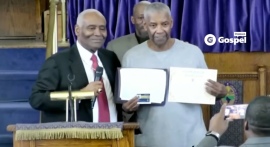
Church leaders and human activists joined together to honor the legacy of the Late Bishop John Joseph. He became well-known for his advocacy work on human rights, dignity, and religious diversity.
25th Death Anniversary of Bishop John Joseph
On Wednesday, May 3, Archbishop Sebastian Shaw of Lahore asserted at a memorial seminar that they would never celebrate the last accomplishment of Bishop John Joseph. He reportedly holds a position comparable to that of the Church's canonized saints and martyrs. However, they promote respect for human dignity, fundamental rights, and various faith traditions.
UCA News reported that on May 6, 1998, Bishop Joseph, the first priest from Pakistan's Punjab state and the first ethnic Punjabi prelate, ended his life as a form of demonstration against Pakistan's broad blasphemy law. This law imposes death on anyone accused of insulting the Prophet Muhammad.
After a Christian, Ayub Masih, was sentenced to death for allegedly insulting the founder of Islam, the man who committed suicide by shooting himself did so in front of the Sahiwal sessions court in Faisalabad, one of the wealthiest cities in Pakistan. As mentioned, the conviction of Masih was reversed, and he was set free by the Supreme Court in 2002. Campaigners held a vigil in front of the Sahiwal court to show their respect for Joseph's actions.
Despite this, many Christians in the area continue to disagree with the suicide. Father Emmanuel Asi, founder-director of Maktaba-e-Anaveem Pakistan, said that it is essential not to see the bishop's final deed in an empty situation but instead in the context of his lifelong fight for civil and human rights. They reportedly honor him as a martyr because he laid down his life for the people he shepherded. The historical event is commemorated annually to delve more into the questions surrounding its mystique and significance, which ought to develop into a movement.
Also Read:$50 Million Shrine Built to Honor First Martyr Declared by Catholic Church
Remembering Bishop John Joseph
In addition to being a human rights activist, he was a Catholic Bishop and considered himself the Bishop of everyone. Because his fight for social justice and equal rights for Christians was so important, people of all religions and denominations greatly admired and supported him, Catholic Herald reported.
Since he was mindful of the challenging times ahead for the Christian minority and was convinced that peaceful coexistence could be achieved via conversation between faiths, he enjoyed widespread renown among Muslims. This earned him a reputation for championing interfaith dialogue and religious tolerance. On the other hand, time has demonstrated that this could not have been accomplished without him.
People are empowered and motivated by the martyrdom of Bishop Joseph to live their lives in the same manner as he did, to lay down their lives in times of hardship like a good shepherd does for his flock, and to follow in his footsteps. He was under the impression that by making the sacrifice, the Pakistani government and governments from other countries would take notice, and the potential danger to the future of his group would be mitigated. Yet, the violence and abuse directed toward Christians has only increased.
According to The Conversation, blasphemy is a crime that can result in the death penalty in Iran, Pakistan, Afghanistan, Brunei, Mauritania, and Saudi Arabia. Italy, which does not have a majority Muslim population, has among the most stringent blasphemy laws in the world, with a maximum sentence of two years in prison.
People who renounce their faith in Islam may face legal repercussions in around half of the world's 49 countries with a majority Muslim population because these countries have supplementary laws that outlaw apostasy. Countries with a mainly Muslim population all have apostasy laws on the books. Blasphemy and apostasy are frequently accused together in legal proceedings.
Related Article: United States Mint’s 2024 American Women Quarters Program to Honor Rev. Pauli Murray

















